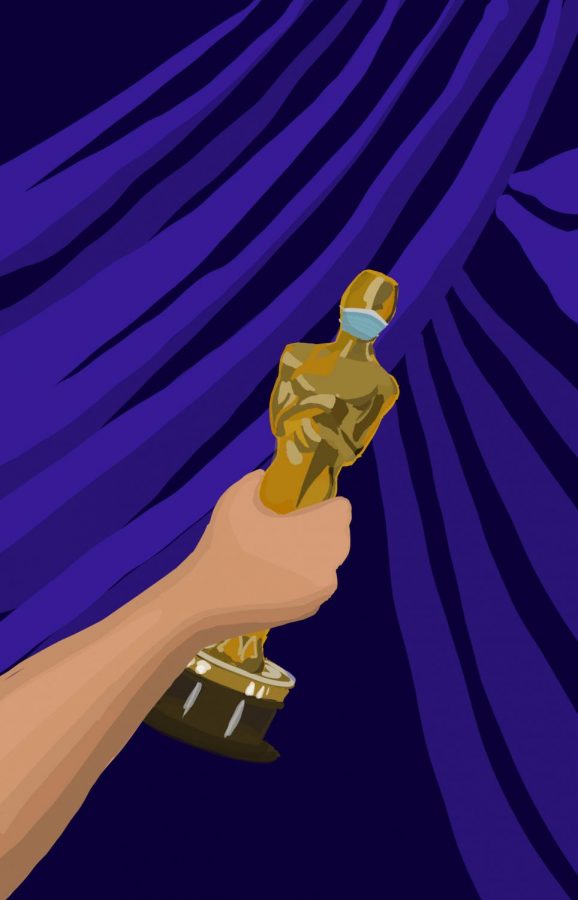The 93rd Oscars Can’t Stick The Landing
Sunday, April 25th marked the 93rd Academy Awards, often lauded as the last ceremony of the award season. In one of the most protracted and exhausting buildups to the glitzy night, many questioned the Academy’s ability to pull off the show’s quintessential glamour within a COVID-19 setting.
For one, Los Angeles’ restrictions have been quite strict regarding how many people can congregate at an event. Not to mention that the show mirrored last year’s no-host style and swapped out its usual venue of the Dolby Theatre for the open-aired Union Station.
Yet with all these setbacks, a majority of a show was surprisingly successful. Leading with an opening sequence by Regina King, she explained the show’s “film set” like conditions which would allow the show to continue at its larger scale. King presented the first awards in the “Screenplay” categories, where Emerald Fennell—writer, director, and producer of Promising Young Woman—won the Original Screenplay category. This marked the first female to win in this category since Diablo Cody won for Juno in 2008.
Soon after, Thomas Vinterberg, director and writer of Swedish film Another Round, accepted the award for Best International Feature Film. In one of the night’s more touching moments, Vinterberg honored his late daughter Ida, who had passed away while the film was in production.
Daniel Kaluuya, who portrayed Fred Hampton, former chairman of the Black Panther Party, in Judas and the Black Messiah went home with the award for Best Supporting Actor. Judas also won the Best Original Song for “Fight For You,” with H.E.R., Tiara Thomas, and D’Mile taking home trophies for their songwriting credits.
The winners for the Best Makeup and Hairstyling categories also made history, with winners Mia Neal and Jamika Wilson from Ma Rainey’s Black Bottom becoming the first Black stylists to win the award.
The night’s first major prize went to Chloé Zhao, who became the first woman of color and only second woman ever to win the award for Best Director. It capped her historic and whirlwind award season, in which she had won big at the BAFTA Awards, Golden Globes, and countless others.
Her win was shortly followed by one of the night’s other big highlights: Yuh-Jung Youn’s victory in the Best Supporting Actress category. Yuh-Jung’s turn as the aloof, yet endearing grandmother in Minari captured audiences’ attention and helped her become the first Korean to win in an acting category.
Even without a host, the show was able to find some entertaining moments, including an Oscar trivia skit that ended with Glenn Close booty dancing to “DaButt” from Spike Lee’s School Daze.
But it was within the show’s last fifteen minutes where the ceremony seemed to take a turn. The pinnacle award—Best Picture—has been the show’s closer for more than 70 years, so when Nomadland took home the honor before the Best Actress and Best Actor categories, many were confused.
While the category of Best Actress was contentious, with most debating between Viola Davis (Ma Rainey’s), Carey Mulligan (Promising Young Woman), and Andra Day (The United States v. Billie Holliday), the Best Actor category had seemed like a lock for months. Following the death of Chadwick Boseman, whose role in Ma Rainey had critics lauding, many assumed that he would posthumously take home the award.
What happened was a one-two hit of shocking surprises, first starting with Frances McDormand going home with her third Best Actress award, and fourth Oscar in total. While critics praised McDormand’s performance in Nomadland for its realism, her name had rarely been brought up in conversations on who would win.
Even more shocking was when the Best Actor category, where a disgruntled Joaquin Phoenix announced that Anthony Hopkins had won for his role in The Father. An onslaught of criticism appeared almost instantly, critiquing the show’s placement of the category in what appeared to be an honor for Boseman, just to snub him.
Although it is not unlike the Oscars to stir some controversy, this year’s twist felt more like a backhand slap. Many believed that the award would honor not only Boseman’s role in Ma Rainey but his legacy as a whole, which included roles such as Jackie Robinson, Thurgood Marshall, and most famously, T’Challa from Black Panther.
While his reverence will likely not be shaken by the loss, the same cannot be said for the Oscars, whose ratings seem to continuously decrease. Sunday’s airing marked the lowest viewership in history with around 10 million viewers, a drop of more than 50% from last year. Whether this is due to the host-less ceremony style, or the sheer fact that many were not able to watch this year’s nominated films, the Academy clearly needs a makeover if they want viewers to remain interested.

Harriton senior Ty Nagvajara is very excited to become the Co-Executive Editor for The Harriton Banner this year. Last year he worked as the Arts &...


